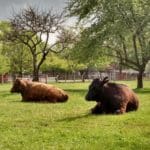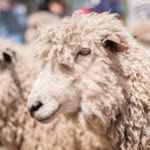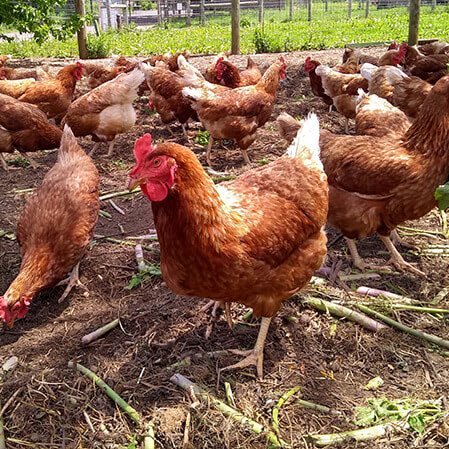Livestock
Queens Farm’s livestock reflect the agricultural history of this region after colonization, when family homesteads once dotted the landscape. Today, patrons can visit these animals and learn about their important roles on the farm.
Queens Farm currently cares for the following animals:
- 2 steer (neutered male cattle; Dexter breed)
- 9 sheep (Romney, Cormo & Jacob mix breeds)
- 5 goats (LaMancha & Saanen breeds)
- 2 alpaca (Huacaya breed)
- 2 pigs (Kunekune breed)
- ~300 hens (heritage and rare breeds; brown, blue, and white egg layers)
- Honeybees in the farm’s apiary
Fresh eggs are produced from the farm’s heritage breed hens; fiber from its sheep and alpacas; and honey from its bees which can be purchased in the Farm Store. The farm sells about 2,800 dozen eggs and 1,000 pounds of wildflower honey each year.
The livestock enjoy a varied diet, thanks to the farm’s vegetable operation, perennial spaces, and weeding practices. The hens, goats, sheep, and alpacas are fed supplemental fermented grain, a byproduct of brewing beer that is supplied by our partners at Bridge and Tunnel Brewery in Ridgewood, Queens. The chickens also delight in day-old bagels donated to the farm by What-A-Bagel in Glen Oaks.
The farm uses rotational grazing techniques in which livestock forage in a system of animal paddocks that spread over many acres. This helps keep the animals healthy and provides optimal nutrition. Queens Farm also utilizes the practice of Silvopasture in its woodlands – a time-tested, sustainable approach of pasturing animals amongst trees. This methodology provides shade and serves as a carbon sink, one way to proactively fight global warming.
A farm with livestock is much better positioned to address the ongoing need to fertilize the soil; the animals’ manure is an important input into our composting system. As citizens become increasingly more disconnected from food and farming, Queens Farm’s livestock provide a unique opportunity to demonstrate animal husbandry within New York City.



You are welcome to feed hay (available at the farm store) to goats and sheep. Please don’t give pumpkins, apples, donuts, or other “people food” to any livestock on the farm! Our farmers regulate these animals’ diets to keep them healthy.
Hens, steer, alpacas, sheep, goats and pigs live in designated coops and paddocks on the farm. Guests are required to remain outside of fenced areas at all times during their visit. Additionally, our 47 acres of grounds contain wooded areas, which are home to local wildlife. Do not feed or approach any animals you may encounter in their natural habitat.
